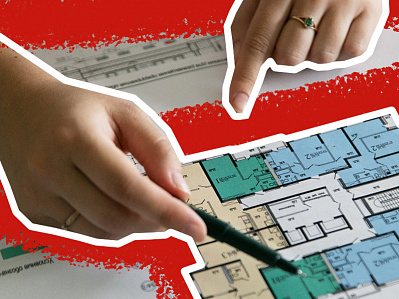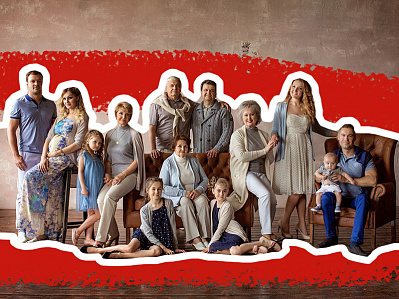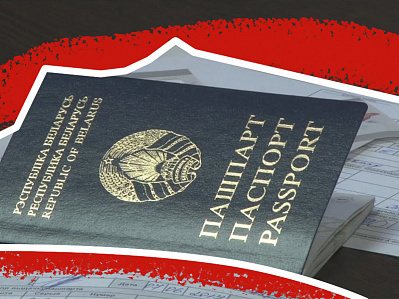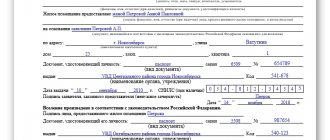All information about what registration is - also known as registration - and how it affects a real estate transaction
Remember how, as a child, you and your parents carefully memorized your home address? Perhaps even before they studied the numbers and learned how a street differs from an avenue, and an alley differs from a dead end. And when you grew up, many times in various documents you filled out the “place of residence” field and probably asked the question: should I write where I actually live or where I am registered?
Our address contains important information that is needed in a variety of situations and about which we are required to notify the government. In this article we will understand what registration is, which we habitually call “propiska”, and find out what obligations in connection with registration at the place of residence and stay exist for those living in Belarus.
For buyers and sellers of real estate, information will be relevant about how registration issues affect the transaction, as well as instructions that will help you go through the re-registration process when registering the purchase and sale of housing.
What is registration, and how does it differ from registration?
From the point of view of current legislation, registration as such does not currently exist in Belarus. In 2008, it was replaced by the institute of registration, although in everyday life many still use the word “propiska”. Accordingly, the previously existing concept of “permanent registration” has been replaced by “registration at the place of residence”, and “temporary registration” - with “registration at the place of stay”.
So, in accordance with Presidential Decree No. 413 “On improving the system of registration of citizens at the place of residence and place of stay,” everyone permanently residing on the territory of Belarus, whether a citizen of the Republic of Belarus or another state, as well as a stateless person, is obliged to register at the place of residence within The Republic of Belarus. The procedure for this process is provided for by the Regulations on registration of citizens at the place of residence and place of stay attached to the decree.
Registration at the place of residence is issued for an indefinite period and is valid until a person is deregistered at the specified address, for example, upon obtaining permanent registration in another place, leaving for permanent residence outside of Belarus, or declaring him missing.
The presence of registration at the place of residence is recorded with a stamp in the passport indicating the address and date of registration. A person must apply for its registration no later than a month after the actual change of permanent residence.
Only at your place of permanent residence do you have the right to register as someone in need of improved housing conditions, receive a plot of land, and also join a housing cooperative. In addition, at the place of permanent registration, you can participate in elections, register as an individual entrepreneur, register with the tax office and military registration and enlistment office, register vehicles, and so on.
Registration at your place of residence is not an obligation, but your right. It is issued for a period of up to one year at the address where you plan to live for some time (or already live). This could be rental housing, a campsite, a sanatorium, or a garden house in a gardening partnership. Temporary registration does not cancel or replace permanent registration. A note about it is not made in the passport, but the person receives a special certificate. To register at the place of residence, together with all owners, you must contact the organization performing the functions of the passport office.
Place of residence and place of registration - what are the differences?
So, a certain place in which a person is temporarily located for a period of time (less than 3 months without registration or more than 3 months with registration) is called the place of stay. This could be a hotel, a sanatorium-resort institution, a rented apartment, a recreation center, etc. Employees of enterprises such as hotels register visitors themselves, and in the case of rental housing, a person registers himself.
We recommend reading: How to obtain Monegasque citizenship
Current Russian legislation allows citizens to move around the country as they please, however, there is a procedure according to which living outside a permanent place of residence is allowed for no more than 90 days - otherwise, they will have to contact the authorized bodies to obtain temporary registration at the place of residence.
What are the requirements for registration in Belarus?
In our country, you cannot deregister at your place of residence, figuratively speaking, “to nowhere” - you can only re-register at a new place. You can cancel your permanent registration without re-registration at another address if you do not live in Belarus for more than six months a year (you have a passport of the “RR” series, that is, a passport of a citizen of the Republic of Belarus for permanent residence outside of Belarus, or you have ceased citizenship).
In other cases, failure to register at the place of residence is an administrative violation. Responsibility is provided for it: upon initial detection - a warning, if repeated within one year - a fine in the amount of two to four basic units.
There is a norm of free total area per person registered at a permanent place of residence. In Minsk it is 20 square meters, outside the capital - 15.
Without taking into account free meters, the following are registered in Minsk:

- • the owner to an apartment belonging to him;
- • one spouse at the place of residence of the other;
- • minors and adult children at the place of residence of their parents;
- • parents at the place of residence of the children;
- • siblings if they are minors and do not have parents, as well as if they are adults but do not have parents or their own families and are disabled.
In all other settlements except those listed above, the following are registered:
- • grandchildren to their grandparents;
- • grandparents to grandchildren;
- • siblings.
Temporary registration is issued without taking into account the standards for the total area of living space.
The question often arises about the possibility of registering with a gardening partnership. According to the legislation of Belarus, garden houses are not intended for permanent residence, and you can only register in them on a temporary basis. Even if your dacha is actually a residential building, according to the documents it will be registered as a garden house, accordingly, you will need to have registration at your place of permanent residence at a different address.
In what cases is it worth buying a residential garden house, what to pay attention to and where in Brest and its suburbs to find a dacha for permanent residence, read the article “Is there life in the dacha?”
Place of residence and stay
This is the territory where a citizen temporarily resides: a hotel, sanatorium, holiday home, boarding house, camping, hospital, tourist center, other similar institution, as well as residential premises that are not the citizen’s permanent residence address. This definition is given in the Rules for registration and deregistration of citizens of the Russian Federation at the place of stay and at the place of residence within the Russian Federation, approved by Decree of the Government of the Russian Federation No. 713 of July 17, 1995 (hereinafter referred to as the Rules).
In other words, if you live somewhere without registration (temporary or permanent), you may be fined for this. But only if they prove that you live at this address permanently, and accordingly must be registered at your place of residence. Or that you have been living at this address temporarily, but for more than 3 months. This means they must be registered at their place of residence.
We recommend reading: Payments after the death of a mother
Who can you register in your home?
In your own residential premises (including if you own a share in the right), you can register any person, as a family member, who is not related to you. However, there are a number of features.
The Housing Code defines as family members the owner's spouse, children, including adopted children, parents, adoptive parents. Their status is confirmed by documents confirming marriage and the existence of relevant family relationships. In addition, family members include siblings, grandparents and grandchildren, if, in addition to the presence of family relations, they live together with the owner and conduct a common household with him.
So, the first feature is related to obtaining the written consent of co-owners, tenants, as well as adult family members living in the residential premises:
- • When registering at the place of residence or stay of participants in common shared ownership, as well as the tenant who rents this housing, consent is not required.
- • If the owner wants to register family members in the premises: spouse, parents and children, only his consent is sufficient.
- • If the tenant wants to register a spouse, parents and children in the premises, his consent and the consent of the owner are required. The exception is minor children - for their registration at the place of residence of the parents, the consent of the owner and other persons is not required.
- • In other cases, it is necessary to provide the consent of other persons registered on the premises.

The second situation is relevant when you need to register a person who is not a member of the owner’s family. In practice, registration authorities often require a rental agreement in this case. It can be either fixed-term or indefinite, and implies that the tenant pays for the use of the premises. You can enter into an agreement for free use with relatives and in-laws*. It has a fixed duration and does not obligate the person you want to register to pay for the accommodation.
*For reference: relatives are considered to be a spouse, parents, adoptive parents, children, including adopted children, siblings, grandparents and grandchildren, as well as other citizens who are related, have common ancestors up to and including great-grandfather and great-grandmother. Relatives are your spouse's relatives: parents, adoptive parents, children, including adopted children, siblings, grandparents and grandchildren.
If the housing is leased, you can register the spouse, parents and children of the lessee without the consent of the adult family members living together with him, as well as the lessor. Other persons (relatives, in-laws and disabled dependents) - in agreement with the leasing company and all adult family members living in the residential premises. Read more about this in the article “Leasing real estate for individuals in Belarus.”
When to re-register - before or after a purchase and sale transaction?
Both options for resolving the issue of re-registration are allowed from a legislative point of view and do not affect the possibility of concluding a real estate purchase and sale agreement. However, the parties to the transaction often disagree on this issue. It is usually preferable for the buyer for the seller and his family members to be deregistered before the transaction. In this case, the new owner receives housing in which no strangers are registered, and where he can immediately register.

In a pure sale, when the seller does not buy a replacement property and has the opportunity to re-register for another property, this is what happens. When he makes a counter-purchase, before the transaction is completed he often has nowhere to re-register, or he does not want to go through this procedure twice. Some sellers, even if they have the opportunity, justify their reluctance to deregister before the transaction with fears that it may not take place for some reason.
There is no single advice on this issue - the parties must strive to reach an agreement through negotiations. If the seller has the opportunity to re-register before entering into a sales contract, or even during the pre-sales process, this can have a positive impact on the sales process. “Vacant” real estate, in which no one is registered, can quickly find its buyer. If the seller plans to check out after the transaction, the buyer can use this as a bargaining argument, or even refuse the purchase altogether.
At the same time, if you want to buy a property and the seller cannot check out before the purchase agreement is concluded, you should keep in mind that your title to the property will not be affected in a global sense. And evaluate the benefits and risks, which will be discussed below.
What is the procedure for re-registration when selling a home?
To register at a different address on a permanent basis, you must write an application and submit documents for registration at the new place of residence at the settlement and reference center (ZhES, owner's association, village council). At the same time, there is no need to cancel the old registration - this happens automatically after re-registration.
The package of documents for registration at the place of residence includes:
- • Statement;
- • Passport or other identification document;
- • Title documents for the property in which you plan to register, as well as a certificate of state registration;
- • Documents that are the basis for registration at the place of residence: - confirming relationship with the owners (birth certificate, marriage certificate, agreement on recognition as a family member, etc.);
- — agreement for the rental of residential premises, gratuitous use, financial lease (leasing);
- - the court's decision.

Personal presence with passports and written consent for your registration of all co-owners and adult family members living at this address is also required. Or a pre-executed notarized consent from everyone.
Your passport with a mark of new permanent registration will be returned to you within three working days. Then the message about the change of registration will also be sent to the place of previous registration within three working days, and you will be deregistered at your old address.
Is consent for sale required from those registered at the place of residence?
In accordance with paragraph 22.18.1 of Presidential Decree No. 200 of April 26, 2010 “On administrative procedures carried out by state bodies and other organizations at the request of citizens,” one of the documents provided to certify a contract for the sale of real estate is the written consent of adult members, former members families of the owner of the residential premises, as well as citizens living in residential premises provided by testamentary refusal or on the basis of a lifelong maintenance agreement with dependents.
The question of the need for the consent of the tenant with whom the rental agreement is concluded does not have a clear answer at the legislative level. On the one hand, the legislation does not give the tenant of a private housing property the right to limit the owner of a residential property in his ability to sell his property.
At the same time, the alienation by the owner of the residential premises in which the tenant lives under a rental agreement may lead to the termination or modification of the rental agreement.

Since the instructions on the procedure for performing notarial actions stipulate that when certifying an agreement for the sale of residential premises, the notary is obliged to request the written consent of the persons who, in accordance with the law, are necessary for alienation, but an exhaustive list of such persons has not been established, in current practice this issue is resolved as follows.
Notaries require written consent for the sale if the tenant is registered in the residential premises on the basis of an open-ended lease agreement. If the rental agreement has a validity period, then the consent of the tenant is not required. As a rule, in each situation individually, based on all known circumstances, the notary decides whether it is necessary to provide the consent of the tenant to certify the contract for the sale of residential real estate.
In this article we talked about the main issues relating to registration at the place of residence and stay in Belarus and their impact on the sale of real estate. However, there are many circumstances, nuances and features of each unique case that cannot be described in one publication. If you still have questions about your situation, please contact the legal department of our agency for expert advice.
What is meant by place of residence?
In the legislation of the Russian Federation, a place of residence means a residential facility in which a person lives permanently. As a rule, this is his apartment or house. A citizen of the Russian Federation can register there at the place of residence or, to put it informally, “propiska”. In a number of cases, he is obliged to do this - for example, if he moves to another city for permanent residence. According to the legislation of the Russian Federation, registration in this case must be completed within 7 days from the date of relocation.
As in the case of temporary registration, registration of registration must be carried out on the basis of certain official documents. In this case, these may be a certificate of ownership (or an act of acceptance of housing - if we are talking about a new building) or, again, the consent of the owner of the residential premises to register registration in the name of another person.
Once registered at an address that corresponds to the citizen’s place of residence, as a rule, there is no limitation on the period of validity - unless it is canceled for legal reasons.
Registration is usually confirmed by a stamp in the citizen’s passport.








